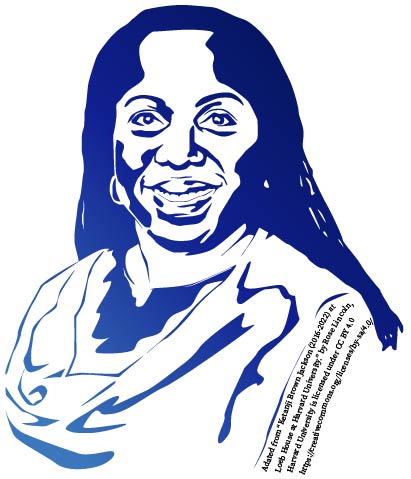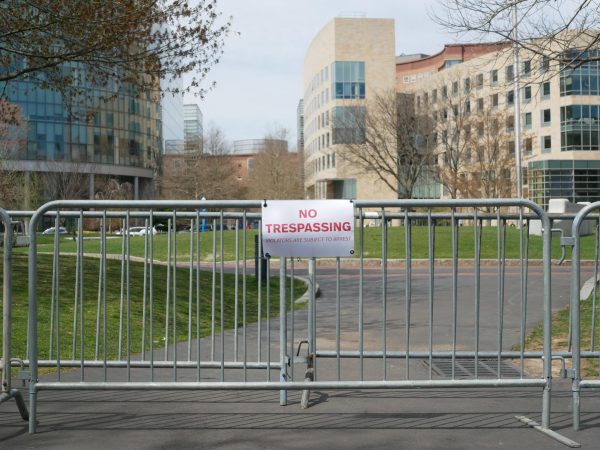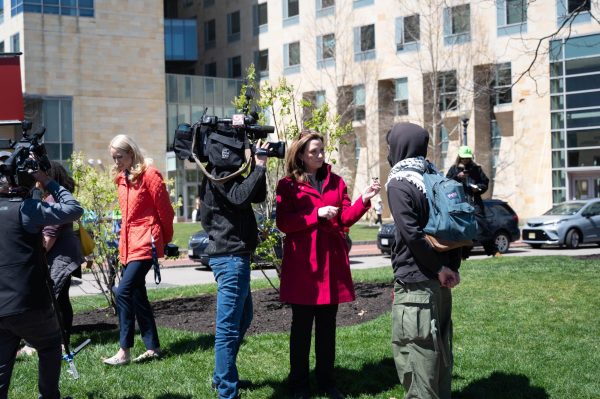Boston students react to Biden’s nomination of Ketanji Brown Jackson

Ketanji Brown Jackson, a judge on the District of Columbia circuit of the U.S. Court of Appeals. Credit to Avery Bleichfeld.
March 10, 2022
After Justice Stephen Breyer announced his retirement from the Supreme Court, President Joe Biden was tasked with finding a successor. On Feb. 25, Biden announced he would nominate Ketanji Brown Jackson, a judge on the District of Columbia circuit of the U.S. Court of Appeals.
If confirmed, Jackson would be the first Black woman to serve on the Supreme Court, fulfilling one of Biden’s key campaign promises. Ted Park, a Boston College junior majoring in political science and finance, said this move was important to satisfy those who voted for Biden in 2020.
“When politicians make promises, people assume that the promises won’t be kept,” Park said. “[Biden’s] decision to keep with the promise shows his commitment to the voters, and I think that this was as good of a move that he could have made.”
Brayden Soffa, a second-year political science major at Boston University, said making the Supreme Court a more diverse institution is a step in the right direction.
“It’s about time to have a Black woman on the Supreme Court,” Soffa said. “It gives diversity of perspectives and that’s exactly what we want from an institution like the Supreme Court. We want it to represent the demographics of America, rather than being skewed white and male as it has been in the past. I’m excited to see the new perspectives that she brings to the court.”
However, bipartisanship is threatening a successful confirmation vote. Jackson faces a politically-divided senate, and many Republican senators have been hesitant to offer her their support. In a recent statement, Sen. Lindsey Graham (R-S.C.) said Brown’s nomination “means the radical Left has won President Biden over yet again.”
Jackson has a history of advocating for criminal justice reform andher stances have led to mixed opinions from those on either side of the political spectrum. Emma Cudahy, a first-year political communications major at Emerson College, noted that Jackson’s advocacy work could be controversial on the senate floor.
“A lot of the work [Jackson has] done in the past to [reduce] sentences for drug policy and things like that is a big goal for progressives,” Cudahy said. “I think that a lot of people think it’s a really good move but a lot of progressives are criticized for [drug policy reform efforts] as well. I think that is going to be a big appeal for some and a big drawback for others on the right.”
Park also emphasized the additional challenges that Jackson faced as a woman of color.
“[Fox News anchor] Tucker Carlson recently spoke about Brown Jackson and … he raised the question of what Brown Jackson’s LSAT score was,” Park said. “It really shows that when it comes to a person of color in politics, there is an idea that they are unqualified and that they are proof of ‘special treatment.’”
Jackson was raised in Miami, Florida, and earned her undergraduate degree in government at Harvard University and a law degree at Harvard Law School. For some students, her background brings into question the disproportionate number of Ivy League graduates called to the Supreme Court.
“I would hope that they have a range of diverse backgrounds, and I would hope that they consider a variety of schools, not just the elite law schools or Ivy Leagues in the northeast,” Soffa said.
But, Cudahy noted, with mounting criticisms of Jackson, her Ivy League background could be a saving grace.
“I think it’s important to have diverse perspectives, but because she’s coming from a place of being a very liberal judge, that it gives her an extra safety to be from a big name law school that people trust,” Cudahy said. “If she was coming from a place that the American public didn’t trust to be a strong law school, it would be used as another strike against her.”
Before serving on the federal district court and the court of appeals, Jackson also served as a public defender in Washington, D.C., making her the first former public defender to be nominated to the Supreme Court.
“Given the nature of her position on the federal courts, she specializes in more technical disputes rather than hot button issues,” Park said. “With high profile cases like [Dobbs v. Jackson Women’s Health] or the New York State Rifle Organization case, I think Judge Brown Jackson will have the opportunity to state her position and should Democrats get the opportunity to shift the court in the future, I think she will present a strong base to help shift and shape America’s political thought moving forward.”
Though generally supportive of the choice to nominate Jackson, the students who spoke with The News also reported criticisms of Biden’s process in his nomination. Soffa expressed a desire for more transparency in the selection process.
“I think I would have liked the process to be more open,” Soffa said. “I would like to see more reasoning as to why the choice was made, but I have no reservations about him choosing Brown Jackson; I just wish that he made the process more open so we could see who else was considered for the role.”
Cudahy said as a student of political communications, she was inclined to look at how Biden publicized his decision after the choice was made.
“The nomination hasn’t exactly been at the forefront of a lot of people’s minds because it was released on a Friday and it was heavily overshadowed by the war in Ukraine,” Cudahy said. “I think that the public reaction has been very diminished because of the timing. … A lot of the controversies and conversations that are happening are from people who are already involved in politics.”
Jackson has begun meetings with senators, including the Senate majority and minority leaders. Hearings for her confirmation will begin March 21 and the final vote is scheduled to occur April 8.
“Given the current political climate and how much criminal justice reform and lessening sentences is controversial for Republicans, even if she is completely in the right and she has really good credentials, it will be interesting to see if that’s enough to sway people and actually get her confirmed,” Cudahy said.

















